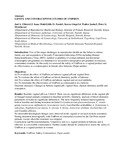Safety And Contraceptive Studies Of Unipron

View/
Date
2013-06Author
Obiero, Jael A
Mulei, Isaac
Farah, Idle O
Linge, Kavoo
Jaoko, Walter
Mwethera, Peter G
Type
PresentationLanguage
enMetadata
Show full item recordAbstract
Introduction: Two of the major challenges in reproductive health are the
failure to reduce family size and acquisition of Sexually Transmitted Infections
(STIs) including Human Immunodeficiency Virus (HIV). Limited availability
of woman-initiated non-hormonal contraceptive programmes is a hindrance to
successful contraceptive programmes in resource-constrained countries. In this
study we assessed the safety of UniPron as a vaginal product and its effectiveness
as a contraceptive in female olive baboons (Papio anubis).
Objectives:
(i) To evaluate the effect of UniPron on baboon vaginal pH and vaginal flora
(ii) To evaluate the effect of UniPron on blood chemistry profile of baboons
(iii) To evaluate the effect of UniPron on baboon vaginal and cervical epithelia
(iv) To determine the effectiveness of UniPron as contraceptive in a baboon
Outcome measures: Changes in baboon vaginal pH, vaginal flora, clinical chemistry
profile and conception
Results: Baseline vaginal pH was 5.8±0.8. There was no significant difference in
the vaginal pH of Smugel treated animals compared to baseline (p>0.05). Similarly,
analysis of blood chemistry parameters revealed no significant differences. The most
frequently isolated microorganisms both at baseline and during treatment included
Corynebacterium glucuronolyticum, C. renale group, Lactococcus raffinolactis,
Leuconostoc lactis, Lactobacillus acidophilus, L. fermentum, L. salivarius,
Staphylococcus aureus, S. xyloxus, S. hyicus, Aerococus viridians, Escherichia coli
and Candida albicans.
No detectable histological changes were observed in the vaginal or cervical sections
examined. During treatment intravaginally with UniPron no conception occurred in
the Uni Pron treated animals, except when the treatment was stopped.
Conclusions and Recommendations: Unipron is safe as a vaginal product in baboons
and is effective as a reversible contraceptive. Further studies should be conducted to
assess the safety of UniPron as a vaginal product in women.
Citation
Jael A. Obiero, Isaac Mulei2,Idle O. Farah, Kavoo Linge, Walter Jaoko, Peter G. Mwethera;Safety And Contraceptive Studies Of Unipron,presented at the 2nd International Scientific Conference, Chs And Knh, 19th - 21st June 2013.Publisher
University of Nairobi College of Health Sciences
Description
Safety And Contraceptive Studies Of Unipron,presented at the 2nd International Scientific Conference, CHS And KNH, 19th - 21st June 2013.
